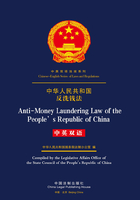
第一章 总则
Chapter Ⅰ General Provisions
第一条 为了预防洗钱活动,维护金融秩序,遏制洗钱犯罪及相关犯罪,制定本法。
Article 1 This Law is enacted for the purpose of preventing money-laundering, preserving financial order and checking the crime of money-laundering as well as related crimes.
第二条 本法所称反洗钱,是指为了预防通过各种方式掩饰、隐瞒毒品犯罪、黑社会性质的组织犯罪、恐怖活动犯罪、走私犯罪、贪污贿赂犯罪、破坏金融管理秩序犯罪、金融诈骗犯罪等犯罪所得及其收益的来源和性质的洗钱活动,依照本法规定采取相关措施的行为。
Article 2 For the purposes of this Law, anti-money laundering refers to the adoption of relevant measures according to the provisions of this Law to prevent any money laundering which is designed to cover up or conceal, by various means, the sources and nature of the criminal gains and proceeds derived from drug-related crimes, crimes committed by organizations of the nature of criminal gangs, terrorist crimes, crimes of smuggling, graft and bribery, crimes of disrupting the order of financial management, crimes of financial fraud, etc.
第三条 在中华人民共和国境内设立的金融机构和按照规定应当履行反洗钱义务的特定非金融机构,应当依法采取预防、监控措施,建立健全客户身份识别制度、客户身份资料和交易记录保存制度、大额交易和可疑交易报告制度,履行反洗钱义务。
Article 3 The financial institutions established within the territory of the People's Republic of China and the special non-financial institutions that are required by relevant regulations to perform the obligation of anti-money laundering shall, in accordance with law, adopt preventive and monitoring measures by establishing sound systems for distinguishing clients' identities, preserving the data for clients' identities and records of transactions, and a report system for transactions involving large sums of money and for dubious transactions, and thus perform their anti-money laundering obligation.
第四条 国务院反洗钱行政主管部门负责全国的反洗钱监督管理工作。国务院有关部门、机构在各自的职责范围内履行反洗钱监督管理职责。
国务院反洗钱行政主管部门、国务院有关部门、机构和司法机关在反洗钱工作中应当相互配合。
Article 4 The administrative department in charge of anti-money laundering under the State Council shall be responsible for supervision over anti-money laundering throughout the country. The relevant departments and authorities under the State Council shall, within the scope of their respective duties, perform their duties of supervision over anti-money laundering.
The administrative department in charge of anti-money laundering under the State Council, the relevant departments and authorities under the State Council and the judicial organs shall cooperate with each other in anti-money laundering.
第五条 对依法履行反洗钱职责或者义务获得的客户身份资料和交易信息,应当予以保密;非依法律规定,不得向任何单位和个人提供。
反洗钱行政主管部门和其他依法负有反洗钱监督管理职责的部门、机构履行反洗钱职责获得的客户身份资料和交易信息,只能用于反洗钱行政调查。
司法机关依照本法获得的客户身份资料和交易信息,只能用于反洗钱刑事诉讼。
Article 5 The data for clients' identities and information about business transactions obtained through performing, in accordance with law, the duty or obligation of anti-money laundering shall be kept confidential. None of the aforesaid data or information may be provided to a unit or individual, unless it is done in accordance with the provisions of law.
The data for clients' identities and information about business transactions obtained in the process of performing their duties of anti-money laundering by the administrative department in charge of anti-money laundering and the other departments or authorities shouldering the duty of supervision over anti-money laundering according to law shall only be used in the administrative investigation of anti-money laundering.
The data for clients' identities and information about business transactions obtained by judicial organs according to this Law shall only be used in criminal litigations against money laundering.
第六条 履行反洗钱义务的机构及其工作人员依法提交大额交易和可疑交易报告,受法律保护。
Article 6 The authorities performing the obligation of anti-money laundering and their staff members that, according to law, submit reports on business transactions involving large sums of money or on dubious transactions shall be protected by law.
第七条 任何单位和个人发现洗钱活动,有权向反洗钱行政主管部门或者公安机关举报。接受举报的机关应当对举报人和举报内容保密。
Article 7 Any unit or individual that finds any money laundering activity has the right to inform the administrative department in charge of anti-money laundering or to a public security organ of such activity. The authority or organ that accepts such information shall keep the informant as well as the contents of such information confidential.